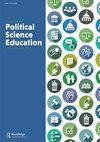通过随机试验分析阅读评估
IF 0.6
Q3 POLITICAL SCIENCE
引用次数: 2
摘要
阅读是大学成功的关键。老师们经常谴责那些不读书就来上课的学生,他们对当天的课程没有准备。然而,相对较少的实证研究评估如何最好地刺激大学生阅读,以及哪种类型的阅读评估能提供最好的学生学习成果。本文对评估阅读依从性和学习的两种常见方法——阅读测验和课程准备作业(cpa)——进行了评估,采用了一项大型政治学入门课程的随机试验。数据显示,学生更愿意完成阅读小测验而非注册会计师,并且学生更愿意完成阅读小测验而非注册会计师。来自2020年评估批判性阅读技巧研究的数据表明,两组学生在通过考试或论文测量的学习成果上几乎没有实质性差异。这些发现为传统的阅读检查或评估方法可以为学生的学习过程提供价值提供了实证支持。讨论了不同课程形式对教师的影响。本文章由计算机程序翻译,如有差异,请以英文原文为准。
Analyzing Reading Assessments through a Randomized Trial
Abstract Reading is critical to success in college. Faculty members often decry students who come to class without reading, and unprepared for the lessons of the day. Yet, relatively little empirical research assesses how to best stimulate collegiate reading and what types of reading assessments provide the best student learning outcomes. This paper assesses two common ways of assessing reading compliance and learning—reading quizzes and Course Preparation Assignments (CPAs)—using a randomized trial in a large introductory political science course. The data show that students are more compliant with completing the reading quizzes vs. the CPAs, and that students prefer completing the reading quizzes to the CPAs. Data from the 2020 Assessing Critical Reading Techniques study demonstrate little substantive difference between the two groups on the measured learning outcomes through either the exams or the papers. These findings provide empirical support that traditional methods of reading checks or assessments can provide value to the student learning process. Implications for instructors across different course formats are discussed.
求助全文
通过发布文献求助,成功后即可免费获取论文全文。
去求助
来源期刊

Journal of Political Science Education
POLITICAL SCIENCE-
CiteScore
1.80
自引率
36.40%
发文量
69
期刊介绍:
The Journal of Political Science Education is an intellectually rigorous, path-breaking, agenda-setting journal that publishes the highest quality scholarship on teaching and pedagogical issues in political science. The journal aims to represent the full range of questions, issues and approaches regarding political science education, including teaching-related issues, methods and techniques, learning/teaching activities and devices, educational assessment in political science, graduate education, and curriculum development. In particular, the journal''s Editors welcome studies that reflect the scholarship of teaching and learning, or works that would be informative and/or of practical use to the readers of the Journal of Political Science Education , and address topics in an empirical way, making use of the techniques that political scientists use in their own substantive research.
 求助内容:
求助内容: 应助结果提醒方式:
应助结果提醒方式:


